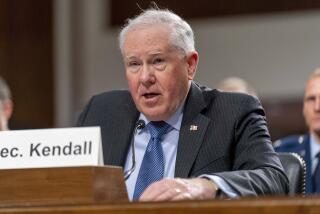Defense Firms May Share Data on Corrupt Purchasing Agents
- Share via
WASHINGTON — Executives of three California aerospace firms, testifying before a Senate panel Wednesday, said their companies’ personnel policies are not designed to stop crooked purchasing agents from getting new jobs at other firms even if they are under suspicion of wrongdoing.
Those policies, however, are under review and may change to provide a somewhat freer exchange of information when it comes to employee integrity, the witnesses told the Senate Governmental Affairs Committee’s subcommittee on oversight of government management.
The subcommittee called the hearing in order to examine the problem of the so-called revolving door, in which purchasing agents involved in corrupt practices often move through the industry with virtual impunity.
Northrop, TRW and Garrett executives at the hearing disagreed on the facts of certain cases when asked about corrupt agents who jumped from one company to another.
A former Northrop employee, identified as “Mr. Brown,” resigned from Northrop in October, 1984, while he was the subject of investigations by a grand jury and by Northrop itself for taking bribes from suppliers. But two months later, he obtained a new job in procurement at TRW in Colorado Springs, Colo.
John J. Richardson, Northrop senior vice president, told the committee that Northrop had told TRW about the investigation into the man’s activities.
However, Berwyn Fragner, TRW vice president for human relations, who was also testifying to the subcommittee, denied that TRW had been informed.
Sen. Carl Levin (D-Mich.), a member of the panel, later identified “Brown” as Ronald E. Brousseau Sr., who has pleaded guilty to taking bribes.
A recurring theme at the hearing was the defense contractors’ concern that they could not legally tell other companies of unproven allegations of wrongdoing about current or former employees.
“What if the individual is later exonerated?” Richardson asked. “What about the individual? Allegations are one thing, but proof is another.”
However, Prof. Theodore St. Antoine of the University of Michigan law school told the committee he believes that defense contractors may legally pass on allegations of corruption if they do not do so with malice.
More to Read
Inside the business of entertainment
The Wide Shot brings you news, analysis and insights on everything from streaming wars to production — and what it all means for the future.
You may occasionally receive promotional content from the Los Angeles Times.











